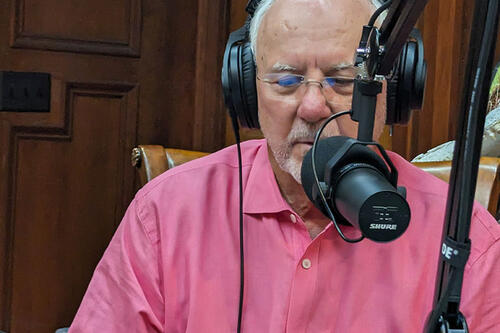
After a 49-year career as a trial attorney, George Speedy ’71 is trading his legal briefs for a microphone, sharing stories from his most memorable cases on a podcast titled “Speedy Law.”
Speedy weaves fascinating and sometimes humorous tales from his decades in the courtroom through his podcast.
Before his time in the courtroom and on the mic, Speedy was a young man searching for direction. His journey to SUNY Geneseo, where he ultimately found his footing, played a big role in shaping the attorney—and storyteller—he would become.
As a high school senior, Speedy applied to SUNY Geneseo and even visited campus, but his grades, which had him ranked 15th out of a graduating class of 20, didn’t pass muster, and he wasn’t admitted. Instead, he attended a state school in Pennsylvania but struggled academically and was asked to leave after three semesters in 1966.
“You know what was happening in 1966,” he recalls.
In 1966, as American involvement in the Vietnam conflict escalated, Speedy knew that leaving college meant losing his student deferment. Rather than waiting to be drafted, he joined the Marine Corps. By March, he found himself in South Vietnam, counting every moment of his service—“13 months, four days, five hours, and 21 minutes.”
Speedy says the Marine Corps instilled the discipline, resilience, and strong work ethic that became crucial to his future success as a student, but it came at a significant cost. "I tell everybody that the Marine Corps was two things for me," Speedy reflects. "It was the best thing that ever happened to me and the worst thing that ever happened to me."
Speedy came home determined to take advantage of the educational benefits of the G.I. Bill, but he also had post-traumatic stress disorder (PTSD) from his combat experiences.
Retooling his life after war meant Speedy sought a supportive, tight-knit community, so he applied again to SUNY Geneseo. He was admitted on a provisional basis in 1969, and after completing two summer courses, he was accepted as a full-time, political science student with a sociology minor.
“You got to know a lot of people,” says Speedy of his classmates. “It was almost like a family. You could depend on people.”
One of those people was the late Don Durbin ’70, who encouraged Speedy to join Sigma Tau fraternity . The brothers provided a needed sense of community and support.
“Everybody who has ever been in combat has PTSD of some level, and it’s a matter of how you deal with it,” says Speedy. “I felt like the camaraderie in Sigma Tau helped me get through some of the experiences, particularly because it was the time of the anti-Vietnam War efforts.”
Speedy wasn't comfortable being among people vehemently opposed to the war, but he took it as an opportunity to listen and learn about viewpoints other than his own, which, he says, became invaluable for his legal career.
Speedy studied law at the University of South Carolina Law School and worked as a bartender at the officers' club at Fort Jackson, S.C. A few months shy of graduation, he accepted a retired Army officer's offer to practice criminal defense law.
Over the years, Speedy built a reputation as a skilled defense lawyer in South Carolina at a time when significant changes were happening in the state's legal system. When Speedy first started practicing, the legal landscape in South Carolina was markedly different from what it is today.
He recalls the days when trials were sometimes held in country stores, and magistrates were often local store owners or politically connected individuals lacking formal legal training. "I used to do trials in the country store, and when the jury went out, they stayed in the store while we waited in the parking lot," Speedy remembers. These early experiences exposed him to the idiosyncrasies and challenges of a system that was, at times, more influenced by local politics than the rule of law.
However, Speedy saw the legal system evolve and modernize over the decades, and his reflections on these changes have become a key part of the stories he shares on his new podcast.
Because of his transformative experience at Geneseo and how it prepared him for life, Speedy has been a generous supporter of the College, including creating the George W. Speedy 1971 Scholarship Endowment. The award provides at least $7,500 toward full tuition and is renewable through graduation to students entering Geneseo who plan to major in political science and demonstrate financial need.
“I wouldn’t be here, right at this place right now, if it weren’t for Geneseo,” Speedy says. “Geneseo was like a family—you could depend on people, and that made all the difference.”